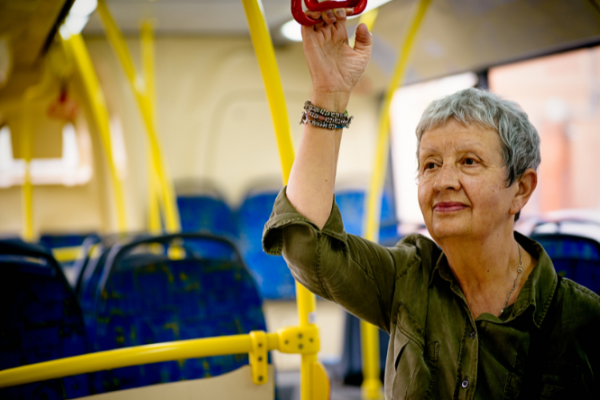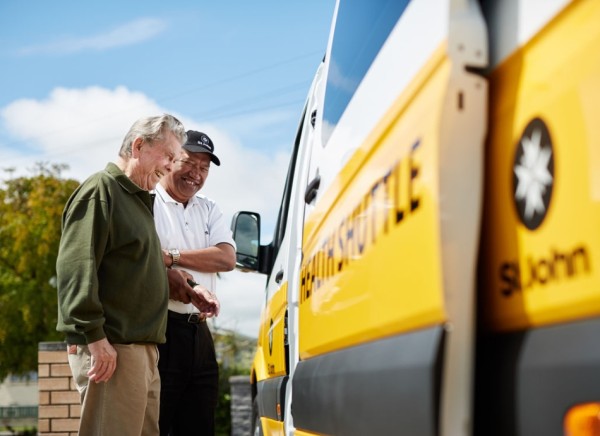If you're a frequent visitor to Healthify, why not share our site with a friend? Don't forget you can also browse Healthify without using your phone data.
Coping without a car – what are your options?
Key points about options when coping without a car
- Not having a car doesn't mean you have to lose your independence or freedom.
- There are many ways to get around without driving yourself, including public transport and community-run services.
- The New Zealand Government has several schemes and subsidies for low-cost and free transport.
- With some planning, you can continue to do the things you enjoy.

Giving up a car can save you money that you’re not spending on fuel, insurance, registration and costly maintenance. This is money you can use elsewhere or to fund other transportation options, such as taxis or public transport.
1. Walking
Walking is a great way to get around and stay healthy. But older people are more at risk of injury if they’re involved in an accident while walking. Be careful, stay alert while out on the road (eg, don’t wear headphones) and wear bright clothes so others can see you. If you’re walking any distance, make sure you don’t get too tired and risk falling. Find a bench and sit down for a while along the way.
2. Cycling
Cycling is a great way to get around, stay healthy, and help the environment. It's also affordable and fun! But, just like walking, when you’re sharing the road or cycle-path, you need to keep your wits about you. E-bikes have changed the game and made the roads accessible for many ages. Remember, take care when you’re travelling at higher speeds.
To be a safe and courteous cyclist:
- Follow the road rules.
- Be visible.
- Show your intentions to turn left or right or stop clearly.
- Be respectful of others.
- Make sure your bike is well-maintained and has working brakes.
- Use headlights and reflectors if riding at night.
- ALWAYS wear a cycle helmet – it’s the rules!
Read more about cycling and cycling safely.(external link)
3. Public transport
In most big cities in Aotearoa New Zealand, local buses, trains and ferries do a good job of getting you from A to B, hassle free! And if you have a SuperGold card, you can travel on these for free at off-peak times. Find out more about SuperGold cards(external link) for people over 65 years of age.
Bonus: having a SuperGold card also means you’ll get special offers and discounts on many other services.
You can also use buses and trains to travel comfortably between many cities.

Image credit: Canva
4. Taxis and ride-shares
Taxis are usually available in most areas. The Total Mobility Scheme provides discounted taxi fares for eligible people with long-term impairments. This includes transport to many organisations such as Alzheimers New Zealand. Read about the Total Mobility Scheme.
Ride-sharing apps such as Uber let you book a driver using your phone. Instead of waiting to find a taxi on the street, or calling a number, you can request a ride through the app. Transport like this is often cheaper than calling a taxi, but might not be available across all parts of Aotearoa.
Driving Miss Daisy(external link) is a pre-booked companion driving service available across many areas of Aotearoa New Zealand. It’s wheelchair accessible, recognised by ACC and is part of the Total Mobility Scheme. Rates will vary depending on the area and requirements of your travel.
5. Family and friends
If your whānau and friends know you don’t have a car, they’re likely to offer you a lift ‘to and fro’ occasionally. Sharing a ride can be a great way to connect and catch up on news. You might like to offer to cover part of the cost of petrol if it becomes a regular thing, eg, a weekly appointment or shopping trip.
6. Mobility scooters
Mobility scooters are good for people who can’t walk far. However, it’s important to know how to stay safe while using one. You can find more information on the Mobility scooters page(external link) including the rules on where and how you can use them.
7. Government support
The National Travel Assistance (NTA) scheme supports eligible people who need to travel long distances or travel frequently for specialist treatment. Learn more about NTA.(external link)
The Total Mobility Scheme(external link) operates nationwide to help eligible people access the right transport to meet their needs.
8. Community transport services
Some local councils and many organisations offer community transport to make sure you can get to your healthcare or other appointments. You can find out what’s on offer in your area by contacting your local council, community centre or church or by googling ‘Community transport services NZ’. This helpful brochure from Age Concern(external link) also lists some community transport providers.
Many hospitals in Aotearoa New Zealand run shuttle services between hospitals. Other services might provide transport to help you get to appointments. Some are free, while others might ask for a fee or donation.
Here are some examples:
- Cancer Society NZ(external link) – a dedicated team of volunteers will drive you to treatments when your whānau and friends aren't available.
- Waka Ora Health Shuttles Hato Hone St John(external link) – a koha (donation) based community service, delivered by volunteers, that transports people to health and wellbeing-related appointments, and then brings them home again.

(Image credit: Hato Hone St John)
SuperGold card(external link) New Zealand Government
Mobility scooters(external link) Waka Kotaki, New Zealand Transport Agency
Cycling(external link) Waka Kotaki, New Zealand Transport Agency
BikeReady(external link) workshops and other cycle skills training New Zealand Transport Agency, Waka Kotahi
National Travel Assistance(external link) Health New Zealand | Te Whatu Ora
Driving Miss Daisy(external link) NZ
Hospital to hospital visitor shuttle(external link) Health New Zealand | Te Whatu Ora Waitemata, NZ
Brochures
Total Mobility Scheme(external link) Waka Kotaki, New Zealand Transport Agency
Life without a Car(external link) Age Concern NZ and Driving Miss Daisy
References
- Driving for older people(external link) Health New Zealand | Te Whatu Ora, NZ
- Life without a car(external link) Age Concern NZ and Driving Miss Daisy, NZ
- Coping without a car over 65(external link) New Zealand Government, NZ, 2020
- Alternatives to driving(external link) NZTA, NZ, 2024
Credits: Healthify editorial team. Healthify is brought to you by Health Navigator Charitable Trust.
Last reviewed:





